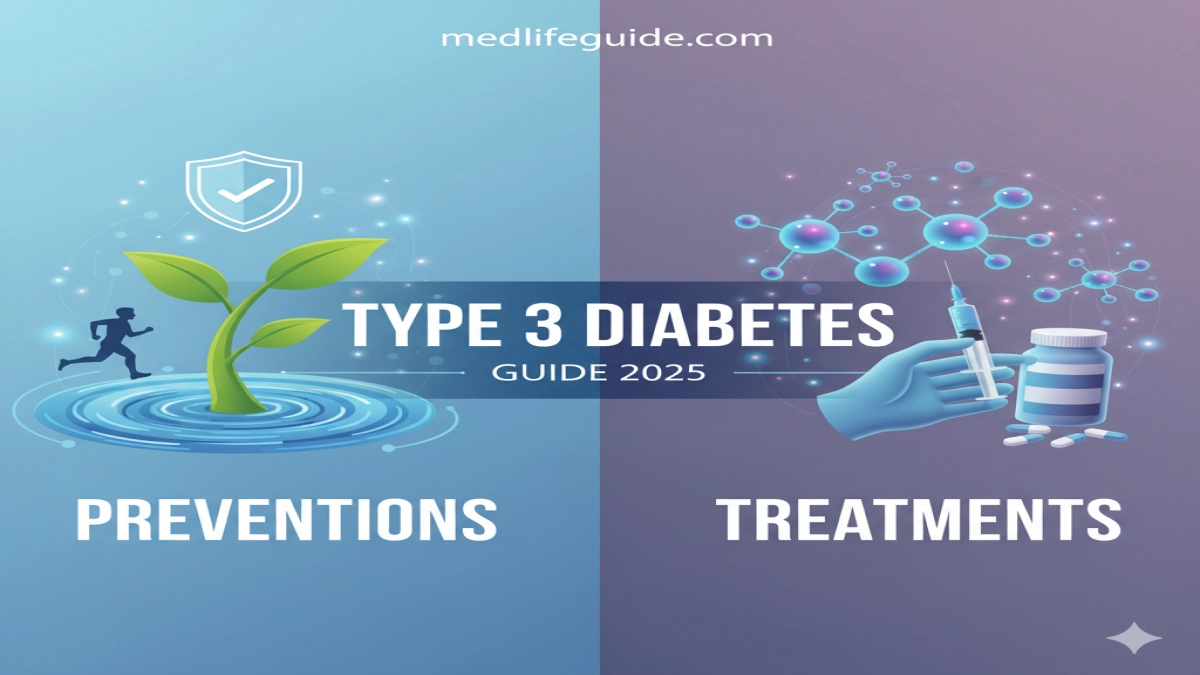Medically Reviewed and Compiled by Dr. Adam N. Khan, MD.
What Type 3 Diabetes Really Means
Here’s the thing. The medical community does not officially recognize “Type 3 diabetes” as a diagnostic label. The term is used in research to describe a proposed link between insulin resistance in the brain and Alzheimer’s disease. Many studies suggest that impaired insulin signaling in the brain may speed up cognitive decline.
So when people say “Type 3 diabetes,” they’re usually talking about Alzheimer’s disease connected to metabolic dysfunction. Understanding this helps guide how we think about prevention and treatment.
Preventions: What Actually Helps
Let’s break it down. Prevention targets metabolic health and brain health at the same time.
1. Keep Blood Sugar in a Healthy Range
Consistent control lowers inflammation and reduces brain damage risk.
2. Anti-Inflammatory Eating Pattern
A Mediterranean or MIND diet is backed by strong research. Think fruits, vegetables, whole grains, olive oil, nuts, beans, and fish.
3. Daily Movement
Walking, strength training, and aerobic exercise improve insulin sensitivity and increase blood flow to the brain.
4. Keep Your Heart Healthy
Blood vessel problems lead to lower brain perfusion. Managing cholesterol and blood pressure is key.
5. Sleep Quality
Poor sleep blocks amyloid clearance from the brain. Fixing sleep is as important as diet.
6. Stop Smoking
Nicotine increases oxidative stress and inflammation in vessels and neural tissue.
7. Stable Weight
Excess fat increases insulin resistance and raises Alzheimer’s risk.
Treatments for Type 3 Diabetes
There is no single medication approved for “Type 3 diabetes,” but treatment focuses on both Alzheimer’s management and metabolic improvement.
Medical Treatments
- Metformin: Improves insulin sensitivity and is being studied for cognitive protection.
- GLP-1 agonists: Early data suggests they may help reduce inflammation and improve metabolic brain signaling.
- FDA-approved Alzheimer’s medications (Donepezil, Memantine, Lecanemab): Help slow progression.
- Statins and antihypertensives: Protect brain blood flow.
Lifestyle Treatments
- Structured exercise plan
- MIND or Mediterranean diet
- Brain training exercises
- Sleep treatment (sleep apnea repair if needed)
Supportive Care
- Occupational therapy
- Caregiver training
- Routine cognitive assessments
Unique Clinical Takeaways
This is the part most guides miss. These points give deeper clinical value.
1. The Brain-Insulin Connection Is Bidirectional
Patients with long-term insulin resistance often show mild cognitive issues years before Alzheimer’s is obvious. This means early metabolic screening (A1C, fasting insulin, lipid panel) should be part of cognitive evaluations for high-risk adults.
2. Differentiating True Alzheimer’s From Metabolic Cognitive Impairment
Patients with “pure” metabolic-related cognitive decline often respond better to lifestyle modifications and glycemic control than classic Alzheimer’s patients. Tracking response to glucose improvement can help with differential diagnosis in early stages.
3. The Role of Mental Health and Stress Load
Chronic stress increases cortisol, which worsens insulin resistance and accelerates memory problems. Patients with high stress often see faster decline unless stress management is included in treatment. This is why cognitive decline protocols should always include sleep, stress, and mood screening.
4. The Gut-Brain-Metabolism Triangle
Gut microbiome imbalance can worsen inflammation and glucose control. Research shows that patients with combined gut dysbiosis and insulin resistance may decline faster. A probiotic-supported, fiber-rich diet may help reduce overall inflammation load.
Living With Type 3 Diabetes
Patients and caregivers can make daily changes that help slow decline.
Daily Support Tips
- Set simple routines
- Use memory tools like reminders
- Limit multitasking
- Use calm communication strategies
Safety Tips
- Remove clutter to prevent falls
- Review medications often
- Watch for depression or anxiety
When to See a Doctor
You should get evaluated if you notice:
- memory lapses interfering with daily tasks
- repeated confusion
- behavior or personality changes
- rapid cognitive decline
- poor diabetes control
Earlier diagnosis means better outcomes.
References and Citations
- Alzheimer’s Association – Alzheimer’s Disease Facts and Figures
- National Institute on Aging – Insulin Resistance Research
- Harvard Medical School – MIND Diet and Cognitive Health
- Journal of Alzheimer’s Disease – Brain Insulin Signaling Studies
- Cleveland Clinic – Type 2 Diabetes and Alzheimer’s Risk Analysis
Medical Disclaimer
This article is for educational purposes only. It does not provide medical, diagnostic, or treatment advice. Always consult your healthcare provider for personal medical guidance.

